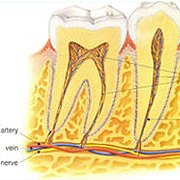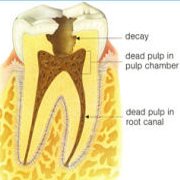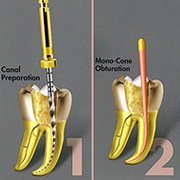ENDODONTICS
Best Orthodontist in Wakad

Endodontics concerns itself with treating diseases of the dental pulp. The dental pulp is the name given to the soft tissue that runs through the canal or canals in the middle of the root or roots of a tooth. The pulp consists mainly of nerves and blood vessels and its function is to provide nutrition for a developing tooth and to provide sensory feedback for an erupted tooth.
How does the pulp become diseased? The most common cause of pulp damage is deep decay that reaches the pulp. Other causes of pulp damage include trauma to the teeth, loose fillings resulting in decay, excessive tooth wear and gum disease. These processes can lead to infection and death of the pulp.
The infection may then spread through the opening at the tip of the root to the surrounding bone, resulting in an abscess which may be very painful and cause swelling. Such an abscess may show up on an X-ray of the tooth.
Symptoms of an infected tooth that the patient may be aware of may include pain, especially at night, pain when biting on the tooth and with heat, discolouration of the tooth and swelling and soreness in the gums surrounding the tooth. Sometimes, curiously, there may be no symptoms from an infected tooth at all that the patient is aware of, and this is where regular dental checkups are important in order to identify and treat such teeth before they give rise to symptoms.
Treatment of an infected tooth is by root canal therapy which involves cleaning away of the infected pulp and filling of the root canals permanently. Root canal therapy should be commenced and completed as soon as possible in order to prevent the possibility of the infection around the tooth spreading and causing more widespread and potentially serious infection around the body, manifesting in such things as facial swelling and fever which may occasionally require hospitalization. The localized spread of an abscess is also important and in time, if left untreated, may result in the loss of supporting bone around the root of the tooth and eventually loss of the tooth.
The infection may then spread through the opening at the tip of the root to the surrounding bone, resulting in an abscess which may be very painful and cause swelling. Such an abscess may show up on an X-ray of the tooth.


All root canals in the affected tooth must be treated. The front teeth (incisors and canines) and premolars typically have one or two root canals. Molars usually have three or four. Root canal therapy may be done over a number of visits, typically two or three, in the case of teeth with active or long-standing and extensive infection but sometimes it may be possible to complete the treatment in a single visit if the infection is of recent origin and relatively mild in symptoms.
Whatever the choice, Contemporary Smiles is your fully trained and equipped centre for root canal therapy. We have invested heavily in the latest techniques and equipment, such as active variable taper nickel-titanium rotary instrumentation and electronic apex location - fancy words, but cutting-edge designs - ensuring that our success rate in endodontics is equivalent to world's best standard at above 95%.
Rubber dam isolation of your tooth during treatment, in order to keep the tooth clean and dry so that effective sterilization of the root canals may be accomplished, is a routine at our practice, rather than a chore as at many other dental practices.
